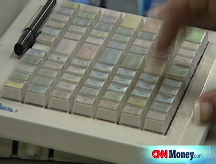Dollar charges forward
Bad news for global economy is good news for the greenback. Dollar hits nearly 2-year high against British pound, gains vs. euro and yen.
NEW YORK (CNNMoney.com) -- The dollar rebound continued Friday, as the greenback climbed to a nearly 2-year high against the pound and extended its gains against the euro, amid troubling signs about the global economy.
The dollar has soared against a number of currencies over the past month, most notably the euro. The 15-nation currency fell to a six-month low against the greenback Friday, sinking to $1.4689 in New York from $1.4803 late Thursday. The euro has fallen more than 13 cents from its high of $1.6038 set on July 15.
The British currency followed, retreating to its lowest level since October 2006. The pound was trading at $1.8632 in late morning trading Friday, down from $1.8685 the previous session. The dollar also climbed against the Japanese yen, rising to ¥110.48 from ¥109.77 late Thursday.
The dollar's newfound strength had a ripple effect across commodity markets as well, as the price of gold and oil declined in Friday trading.
The latest U.S. economic numbers, which included a better-than-expected regional manufacturing reading, helped prop up the dollar in Friday trading. Still, much of the dollar's recent strength can be attributed to a worsening economic outlook for the rest of the globe.
"I think that pretty much sums it all up," said Neil Mellor, currency strategist at Bank of New York Mellon in London.
Figures published by the European Union Thursday revealed that the eurozone economy contracted by 0.2% in the April-June period, raising recession fears.
Earlier this week, the United Kingdom said unemployment is on the rise and inflation will continue to soar to 5%. As a result, the government hinted that interest rates may have to be lowered to prevent the country from entering a recession.
The European Central Bank and Bank of England both decided to hold interest rates steady last week to support economic growth, instead of raising them to combat inflation. And the latest figures suggest that rate cuts could be coming sooner rather than later.
At the same time, the annual inflation rate in the United States surged to 5.6% in July - its highest in 17 years. Rising inflation could prompt the Federal Reserve to start raising rates interest rates.
A combination of rate cuts in Europe and a rate hike by the Fed could help strengthen the dollar further. Rate hikes in the U.S. usually boost the dollar since higher rates increase returns on dollar-based assets.
Some analysts have recently speculated that the dollar rally could have some legs. In a research note issued this week, Goldman Sachs analysts led by Thomas Stolper said the lows the dollar hit earlier this year "are almost certainly behind us."
Another surge in oil prices, a decline in U.S. exports or increasing signs of economic weakness in the American economy could derail the dollar's rebound, analysts warned.
Tyson Wright, a senior FX trader at the Victoria, British Columbia-based global payment firm Custom House Ltd., said he expected the euro to fall to $1.42 against the dollar by year end, but not without some a few hiccups along with way.
"We had a really significant move [in the euro] over the last 3 weeks," said Wright. "On a short-term basis, we're probably going to have a bit of a retracement to the lower $1.50s." ![]()



